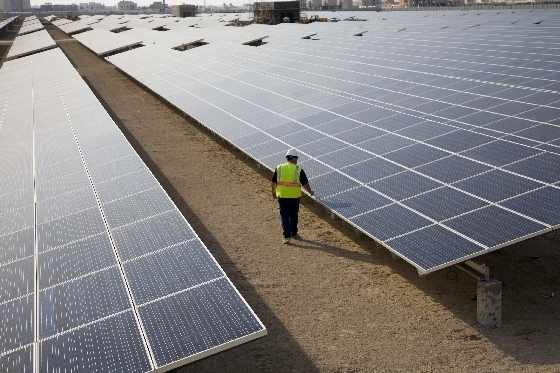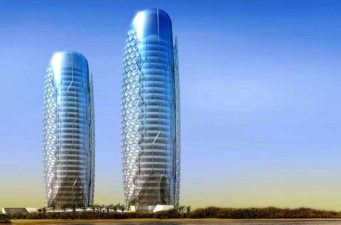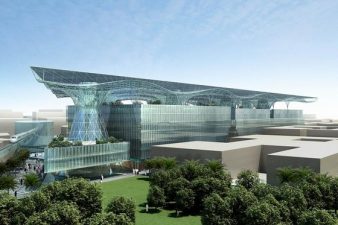Masdar City has experienced knee-buckling setbacks, but we haven’t heard the last of them just yet
Masdar City is hanging on tenterhooks. After questioning the dicey science of carbon credits for big energy companies, we then published assurances by Masdar’s CEO Sultan Al-Jaber that although the project will be delayed because of certain hiccups – not least of which being that no one in the post-industrial world has aspired to a city free of carbon, or cars – it will still proceed. Yet critics like Brett Prior say the Masdar ship is sinking fast.
Shining Promises
Prior dealt a scathing blow to the company’s rhetoric in a recent post for greentechmedia.com. The svelte five act unfolding begins with a little background about Masdar’s much-touted ambitions:
They aimed for a $22 billion dollar, 6 square-km walled city for 45,000 residents and 1,500 businesses to be built by 2016. That city would be run completely on renewable energy sources, generating zero carbon emissions and zero waste. Additionally, 80% of the city’s water would have been recylced.
They boasted a top-notch research facility, the Masdar Institute of Science & Technology (MIST), that would be assisted by Massachusetts’s internationally-acclaimed MIT. Even construction would have been powered by a 40-60MW solar plant and PV panels manufactured on-site.
Uncontrollable dust
But then in Prior’s second act, he describes what become “cracks in the armor.”
In this phase of development, whirling dust storms in August 2009, with “suspended dust in the air between 1,500 to 2,000 parts per million,” decreased solar productivity by 40%. The panels were washed – at great expense – and productivity restored.
Khaled Awad, the director of Masdar City, claimed that “Dust storms have the same impact on a PV panel’s performance as cloud cover. In Abu Dhabi, we have a number of dust storms during the year, but compared with the level of cloud cover that European countries such as Germany receive, the performance in Abu Dhabi is far superior. In fact, on average, a solar module installed in Abu Dhabi will generate twice as much as [one installed in] a cloudy region in Europe.”
Key personnel resign
By the third act, the armor is not cracked, it is shattered.
The deadline is pushed back to 2020 and electricity, it turns out, will have to be imported. The electric transport pods that were supposed to replace cars are only going to be used in certain parts of the city, and Masdar PV fired both their CEO and COO. Then, to top off the floundering debacle, the head of MIST, Tariq Ali, resigned after only 1 year.
Prior considers Sultan al-Jaber’s recent press – in which he is adamant that these are not insurmountable setbacks – as desperate efforts to hold on, to instruct the band to keep playing while the ship sinks.
Given that John Perkins, the provost of the Masdar Institute, also resigned, and that the company that would have provided silicon equipment, Sun Fab, folded its operations, it seems that Prior may be right.
Solar gives hope?
On the other hand, his fourth and fifth acts offer a glimmer of hope.
Abengoa Solar – one of the most established solar power producers in the world – is going to build a $600 million Concentrated Solar Plant, which they plan to expand from an initial generating capacity of 100MW to 2000MW. And funding the $22 billion zero carbon city should be a breeze for Abu Dhabi’s sovereign wealth fund that amounts to a cool $650 billion.
Libya developed a $20 billion man-made river, so there’s no telling what Masdar might still pull off backed as it is by Abengoa and silly money. Though they may not deliver their original, dazzling ambitions, the ship is still afloat. Let’s hope it docks in more sustainable harbors.





Masdar has not been cancelled, its completion date has been extended.
Some people tweeted about duplicate comments. To clarify, yes, I did cut&paste what someone wrote in Greentech because it was the best detailed list of evidence of Masdar City failure that I have seen. I cited it, so where is the problem. No plagiarism here.
The tweeter (PRT) also questioned whether Masdar City had cancelled the original idea of a car-free city by using a PRT network. Well, I did some googling myself, and the first thing that popped up was German leader Merkel filling her car up at a gas station in Masdar:
http://www.ngvglobal.com/german-chancellor-merkel-inaugurates-natural-gas-filling-station-in-abu-dhabi-0526
Asolutely nothing newsworthy or commendable about having NG filling stations. They have been aroung for a century and create carbon and urban traffic. Given that the UAE has to import massive amounts of NG from Qatar (2 billion cubic feet per day), it is additionally unsustainable.
Now you have your proof that they have cancelled the key sustainability features of Masdar, including the PRT. Sorry, “PRT”.
The dust storms are worrying, particularly if we are hinging so many of our energy expectations on solar energy: huge initiatives in the SW desert of the US, Desertec in the Sahara…
I am interested to know more about the dust storms and how they effect productivity.
The answer seems to be total collapse. It appears these Middle Easterners milked this for all it was worth and snookered the “green” community into believing they had serious intentions. They apparently threw hundreds of millions of dollars at an elaborate PR campaign and got their 15 minutes of fame. At least give them credit for fooling you.
But now the party seems to be over and the “green” community is feeling rather stupid having fallen for such a simple bait and switch.
As I understand from sources close to the project, all serious people have already left and/or disengaged to preserve their reputations, the latest being the top two people at the Masdar Institute.
The only people left are large corporates who are sucking up to Abu Dhabi to get juicy infrastructure contracts by giving lip service to this thing (GE, Total, etc). And you can understand why: ok, I will play along and act like I support Masdar, and you will give me a nice fat billion-dollar contract for a new gas field or jet engines in return. The profit on those deals will more than pay for even a total write-off of any CSP plant, etc.
Even MIT is only doing the bare minimum they have to under their consultancy contract (since when is MIT in the consulting business anyhow?).
The entire Masdar City was cancelled because there is simply no demand for it. No one wants to live or work there.
Here was an interesting reader’s comment from the Greentech article you cited that seems to sum it up pretty well:
“For those who have been following this, you’ll remember Abu Dhabi boasting (very) loudly in 2006: “We are building the world’s first zero-carbon, zero-waste, car-free city, 100% powered by renewable energy with 1500 companies and 50,000 inhabitants. It will cover 6 square kilometers and be completed by 2015. . . blah blah”.
Fast forward to 2010 reality:
-did we say zero-carbon? Well, we meant “carbon neutral” , i.e. when we can’t pull it off we’ll just buy carbon credits and greenwash it.
-did we say zero-waste? Hmmn, curiously you won’t hear us saying that now.
-did we say car free? Totally backtracked on that idea. We’ve just signed contracts to have gas stations inside Masdar city and the city-wide PRT contract has been cancelled.
-did we say 100% powered by renewable energy? Yep, backtracking on that as well.
-did we say 1500 companies? Alan Frost, head of Masdar City admitted in the local rag (the National) in March that after 4 years Masdar could only secure one client (GE) for 1000 square meters of rent. One single, lonely tenant. Well, if that is not a totally failed business model, what is?
-50,000 inhabitants? Uh, well, “we’re still looking for the last 49,900. . . .”
-completed by 2015? Er, well, we meant “Phase 1”, whatever that means. . .and we absolutely refuse to define it ourselves, constantly fobbing off nosy reporters with meaningless things like “still on track” and “strategy hasn’t changed”. . . . YAWN!
-6 square kilometers? 4 years later (wow, that’s a lot of time to just be talking, now isn’t it?) there is only the MIST institute. A single tiny institute. Ouch! Meanwhile they built a gas-guzzling Formula 1 racetrack and a gas-guzzling Ferrari theme park in only 2 years. Shows their priorities.
Are people really that dumb? Perhaps it’s time for the green community to move on and focus on real cleantech developments, not a well-crafted mirage.”
While I can not verify everything this author wrote, if it is a scam, let’s expose it and move on to real business.
I don’t think it was the Middle Easterners that milked Masdar, but the North American and European firms that got to try out some of their toys and eco-fantasies.
Um. Sounds like total system failure to me.